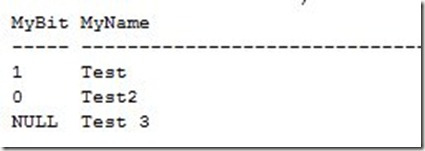Can you set a unique index on a bit field? Well, you can, but you’d end up with a very short table of two (or three) rows. I defined this table:
CREATE TABLE [dbo].[BitTest]( [MyBit] [bit] NULL, [MyName] [varchar](50) NULL ) ON [PRIMARY] GO USE [db1] GO CREATE UNIQUE NONCLUSTERED INDEX [IX_BitTest] ON [dbo].[BitTest] ( [MyBit] ASC )WITH (PAD_INDEX = OFF, STATISTICS_NORECOMPUTE = OFF, SORT_IN_TEMPDB = OFF, IGNORE_DUP_KEY = OFF, DROP_EXISTING = OFF, ONLINE = OFF, ALLOW_ROW_LOCKS = ON, ALLOW_PAGE_LOCKS = ON) ON [PRIMARY] GO
and then added some data
INSERT BitTest SELECT 1, 'Test' INSERT BitTest SELECT 0, 'Test2' INSERT BitTest SELECT NULL, 'Test 3' SELECT * FROM BitTest
This table has these rows:
Adding another row:
INSERT BitTest SELECT 1, 'Test 4'
gets you an error:
However what about a compound index? What if I make the table larger and add more fields. Here’s a larger table:
CREATE TABLE UniqueBit ( BureauID INT , CompanyID INT , DivisionID int , DefaultType BIT , ProductName VARCHAR(100) ) GO INSERT Uniquebit SELECT 1, 1, 1, 1, 'Product 1' INSERT Uniquebit SELECT 2, 1, 1, 1, 'Product 2' INSERT Uniquebit SELECT 3, 1, 1, 1, 'Product 3' INSERT Uniquebit SELECT 4, 1, 1, 1, 'Product 4' INSERT Uniquebit SELECT 1, 2, 2, 1, 'Product 5' INSERT Uniquebit SELECT 1, 2, 3, 1, 'Product 6' INSERT Uniquebit SELECT 4, 1, 1, 0, 'Product 7'
If I now add a unique index:
CREATE UNIQUE NONCLUSTERED INDEX [IX_UniqueBit] ON [dbo].[UniqueBit] ( [BureauID] ASC, [CompanyID] ASC, [DefaultType] ASC, [DivisionID] ASC ) ON [PRIMARY] GO
It works fine. I can add another unique row like this:
INSERT Uniquebit SELECT 4, 2, 1, 0, 'Product 7'
without an error. Adding in a non-unique row:
INSERT Uniquebit SELECT 4, 1, 1, 0, 'Product 7'
gives me an error:
There’s nothing special about a bit column for a unique index. There are restrictions for bit fields in some ways that relate to indexing, but uniqueness is not one of them.
This was inspired by this post (before the complete details from the OP): http://www.sqlservercentral.com/Forums/Topic1126794-149-1.aspx#bm1126850
Filed under: Blog Tagged: syndicated, T-SQL
![]()





